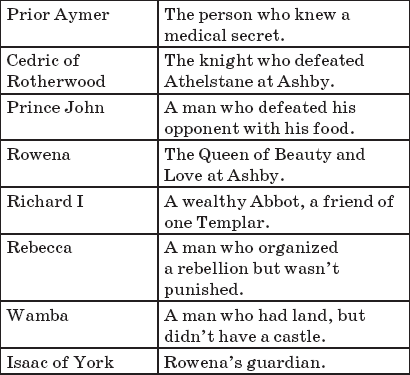Exercises
I. Answer the questions about the text:
Who was Cedric for Wamba and Gurth?
Who was Cedric for Rowena?
What was the name of the Palmer?
Why was Gurth so polite with the Palmer?
How did Isaac the Jew thank the Palmer?
How did Wamba save the situation at Ashby?
Why was Prince John angry with Locksley?
Why did Ivanhoe have the word ‘Disinherited’ on his shield?
Why did the robbers let Gurth go with his money?
Why did the spectators call the Black Knight a lazy knight?
What was the other name of Locksley?
Why did De Bracy attack and capture Cedric and Rowena?
How was Front-de-Boeuf wounded?
Who was Ulrica?
Why did the castle burn?
How did Front-de-Boeuf die?
Why were Richard and Wamba attacked in the forest?
Why did Athelstane not die?
Why did the Grand Master think that Rebecca was a witch?
How was it proved that Rebecca was not a witch?
II. Put the events in the correct chronological order:
The trial at Templestowe.
The storm of the Front-de-Boeuf’s castle.
Gurth’s night adventures.
The general combat on the first day of tournament.
Ulrica’s confession.
Robin Hood invites King Richard to a feast in the forest.
De Bracy’s conversation with Rowena.
Ivanhoe’s victory over Bois-Guilbert at Ashby.
Bois-Guilbert and Abbat Aymer come to Cedric’s mansion.
III. Decide, whether these sentences are true or false:
Wamba was a slave of Cedric.
Gurth was a jester.
De Bracy was a Templar.
Bois-Guilbert was the Grand Master of his Order.
Wilfred of Ivanhoe was Cedric’s son.
Rowena was Cedric’s daughter.
Front-de-Boeuf killed his father.
Wilfred of Ivanhoe was banished from his father’s house because he was a friend and servant of King Richard.
Rebecca was a good doctor.
Gurth brought to his master more money than Ivanhoe gave him.
Ivanhoe killed Bois-Guilbert.
Richard put his brother John in prison.
IV. Match each character with a correct description:

Dictionary
А
Abbey – n аббатство
accused – n обвиняемый
accustomed – adj привыкший
aim – v целиться
ale – n эль (разновидность пива)
ancestor – n предок
archer – n лучник
armour – n доспех
ascetic – n аскет
astonishment – n изумление
axe – n топор, секира
B
banish – v изгнать
barbican – n барбакан (внешнее укрепление, расположенное за крепостным рвом и защищающее ворота)
bend – v сгибать
beware – v беречься, бояться
blessing – n благословение
blow – n удар
bow – v кланяться
brass – n бронза
C
chain – v приковать
challenge – n вызов
champion – n рыцарь, участвующий в поединке или турнире
cloak – n плащ
confession – n исповедь
courage – n храбрость, мужество
courtesy – n благородство, учтивость
courtyard – n двор
crossbow – n арбалет
cure – v исцелить, вылечить
D
delusion – n обман, галлюцинация
descent – n происхождение
despise – v презирать
dignity – n достоинство
disinherit – v лишить наследства
distress – n горе, беда
doubtless – adv несомненно
drawbridge – n подъемный мост
duty – n долг
dungeon – n подземелье
E
enable – v давать возможность
entrance – n вход
exclaim – v восклицать
F
fair – n наследница
forester – n лесник
fury – n ярость
G
gallop – n галоп
generation – n поколение
generous – adj щедрый
glade – n луг (в лесу)
glance – n взгляд
graceful – adj грациозный
gratitude – n благодарность
H
hag – n злая уродливая старуха, ведьма
hasty – adj торопливый
heiress – n наследница
helmet – n шлем
hermit – n отшельник
holy – adj святой
hood – n капюшон
hospitality – n гостеприимство
host – n хозяин
horn – n рог
hut – n хижина
I
impatient – adj нетерпеливый
irritation – n раздражение
J
jester – n шут
K
knave – n плут
L
lists – n арена
litter – n паланкин, носилки
lance – n копье, используемое всадниками
M
maiden – n незамужняя девушка
mansion – n особняк
marsh – n болото
master – n господин
mercenary – n наемник
miracle – n чудо
moat – n крепостной ров
mount – v садиться (на коня)
mourning – n оплакивание
mule – n мул
mutter – v бормотать

